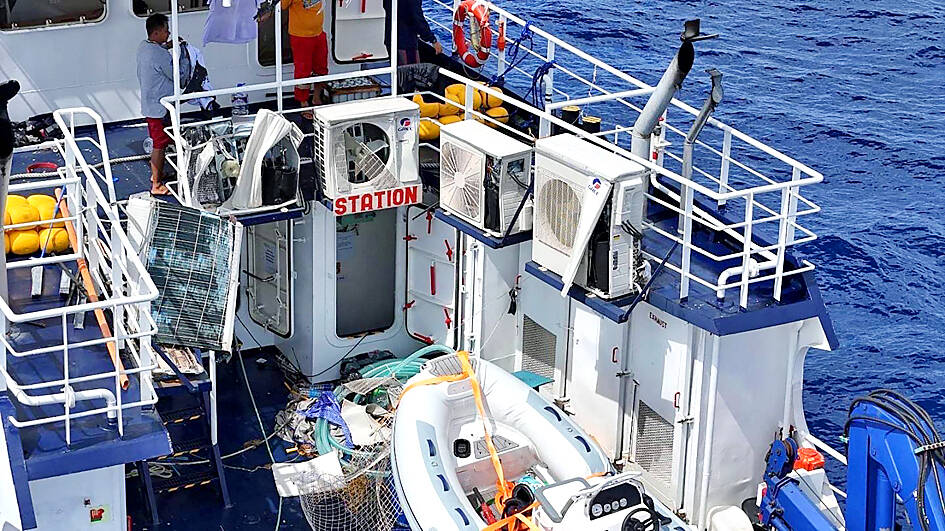The China Coast Guard yesterday said that it fired water cannons at Philippine ships near the disputed Scarborough Shoal (Huangyan Island, 黃岩島) in the South China Sea, accusing Manila of an “illegal” intrusion and the ramming of one of its vessels.
The confrontation comes a week after China approved plans to turn the shoal, that Taiwan also claims, into a national nature reserve, a move that defense analysts have warned would test Manila’s response over the 150km2 triangular chain of reefs and rocks.
The Philippine Coast Guard in turn accused its Chinese counterpart of harassing vessels it said were on a humanitarian mission to support fishers.

Photo: AFP / Philippine Coast Guard
Yesterday’s encounter involved more than 10 Philippine ships, China Coast Guard spokesman Gan Yu (甘羽) said, accusing the vessels of having “illegally invaded China’s territorial waters of the Scarborough Shoal from different directions.”
In particular, he faulted Philippine Coast Guard vessel 3014, saying in a statement that it had “disregarded solemn warnings from the Chinese side and deliberately rammed a Chinese coast guard vessel.”
“The China Coast Guard lawfully implemented control measures against the Philippine ships,” he added.
These included measures such as verbal warnings, route restrictions and water cannon spraying, Gan said.
The Philippine Coast Guard in a statement said that it was engaged in a mission to resupply more than 35 Philippine fishing boats at the shoal when they encountered “aggressive actions” by nine Chinese vessels, and made no mention of water cannon.
Simmering tension over the shoal have led to diplomatic rows, but no incidents have escalated into armed conflict.
Both sides accuse each other of provocations and trespassing in incidents featuring use of water cannon, boat-ramming and maneuvers by the China Coast Guard, as well as jets shadowing Philippine aircraft.
A spokesperson for the Philippine Maritime Council said there was “no truth” in China’s statement that it had taken control measures, which it dismissed as “another case of Chinese disinformation and propaganda.”
Analysts have said Beijing’s plan to categorize the shoal as a nature reserve amounted to trying to take the moral high ground in the dispute over the atoll.
The dispute is part of a contest over sovereignty and fishing access in the South China Sea.
China claims almost the entire South China Sea, overlapping the exclusive economic zones of Taiwan, Brunei, Indonesia, Malaysia, the Philippines and Vietnam. Unresolved disputes have festered for years over the ownership of various islands and features.

Right-wing political scientist Laura Fernandez on Sunday won Costa Rica’s presidential election by a landslide, after promising to crack down on rising violence linked to the cocaine trade. Fernandez’s nearest rival, economist Alvaro Ramos, conceded defeat as results showed the ruling party far exceeding the threshold of 40 percent needed to avoid a runoff. With 94 percent of polling stations counted, the political heir of outgoing Costa Rican President Rodrigo Chaves had captured 48.3 percent of the vote compared with Ramos’ 33.4 percent, the Supreme Electoral Tribunal said. As soon as the first results were announced, members of Fernandez’s Sovereign People’s Party

MORE RESPONSIBILITY: Draftees would be expected to fight alongside professional soldiers, likely requiring the transformation of some training brigades into combat units The armed forces are to start incorporating new conscripts into combined arms brigades this year to enhance combat readiness, the Executive Yuan’s latest policy report said. The new policy would affect Taiwanese men entering the military for their compulsory service, which was extended to one year under reforms by then-president Tsai Ing-wen (蔡英文) in 2022. The conscripts would be trained to operate machine guns, uncrewed aerial vehicles, anti-tank guided missile launchers and Stinger air defense systems, the report said, adding that the basic training would be lengthened to eight weeks. After basic training, conscripts would be sorted into infantry battalions that would take

GROWING AMBITIONS: The scale and tempo of the operations show that the Strait has become the core theater for China to expand its security interests, the report said Chinese military aircraft incursions around Taiwan have surged nearly 15-fold over the past five years, according to a report released yesterday by the Democratic Progressive Party’s (DPP) Department of China Affairs. Sorties in the Taiwan Strait were previously irregular, totaling 380 in 2020, but have since evolved into routine operations, the report showed. “This demonstrates that the Taiwan Strait has become both the starting point and testing ground for Beijing’s expansionist ambitions,” it said. Driven by military expansionism, China is systematically pursuing actions aimed at altering the regional “status quo,” the department said, adding that Taiwan represents the most critical link in China’s

‘REALLY PROUD’: Nvidia would not be possible without Taiwan, Huang said, adding that TSMC would be increasing its capacity by 100 percent Nvidia Corp CEO Jensen Huang (黃仁勳) on Saturday praised and lightly cajoled his major Taiwanese suppliers to produce more to help power strong demand for artificial intelligence (AI), capping a visit to the country of his birth, where he has been mobbed by adoring fans at every step. Speaking at an impromptu press conference in the rain outside a Taipei restaurant, where he had hosted suppliers for a “trillion-dollar dinner,” named after the market capitalization of those firms attending, Huang said this would be another good year for business. “TSMC needs to work very hard this year because I need a lot